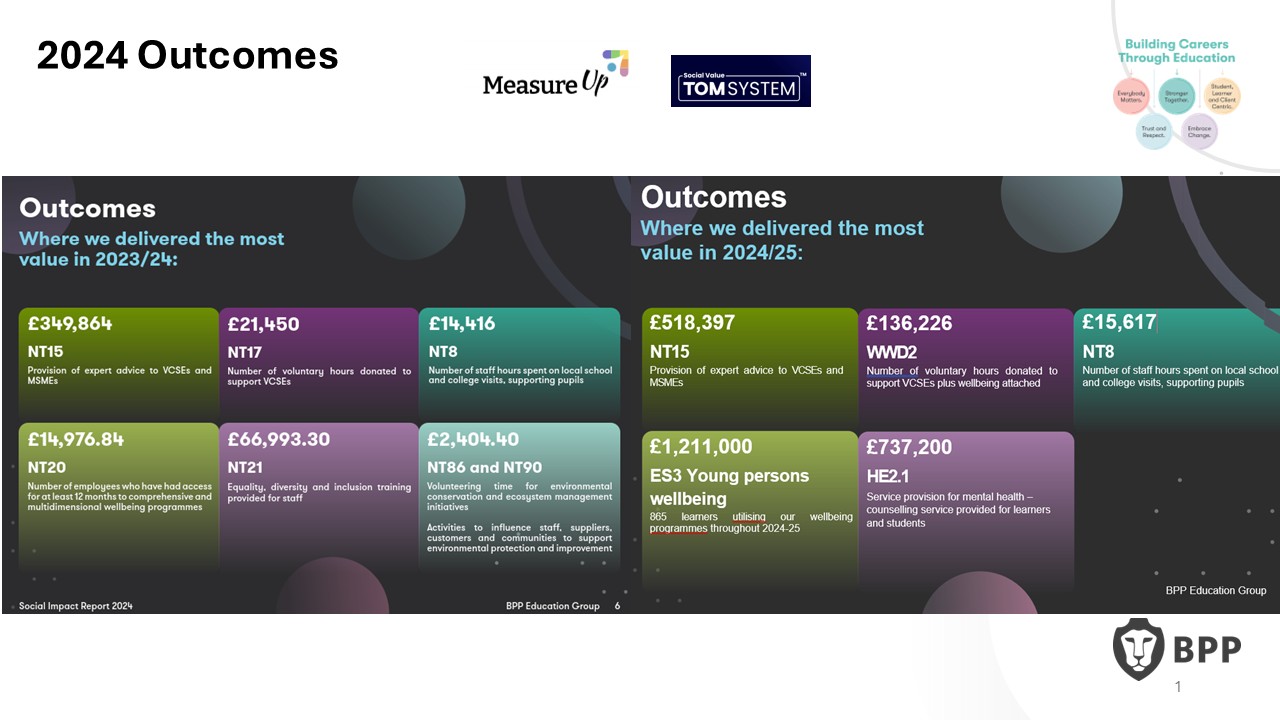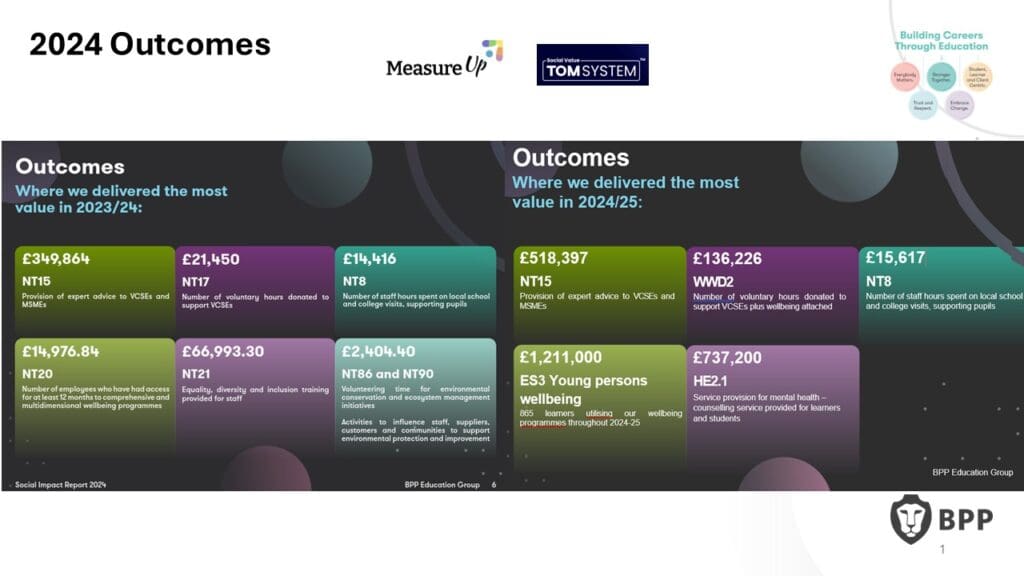[Webinar Recording] Beyond the Scorecard: Winning Bids with Better Social Value Evidence
Posted: September 30, 2025
Social value is no longer an optional extra in procurement – it’s a decisive factor. At our recent webinar, Beyond TOMs – Winning Bids with Better Social Value Evidence, Catherine Manning (Impact & MeasureUp), David Oakes (Bid Director at KLOW Consulting), and Lucy Wildig (Head of Social Impact at BPP Education Group) explored what it takes to move from compliance-driven commitments to evidence-led, impactful practice.
Watch webinar replay and access deck
Access presentation deck
Why Social Value Matters in Procurement
Catherine opened by grounding us in the “big whys” behind social value:
- Driving innovation and opportunity in bids – “There’s the opportunity to gain more financial resources and financial stability,” Catherine noted, “but also to increase innovation by embedding sustainability and impact in bids.”
- Enhancing brand reputation and stakeholder trust
- Managing risk and compliance amid tightening legislation
- Improving well-being at community and national levels
As Catherine put it:
“Can we win work and improve well-being together, or do those two things come up against each other?”
It’s a live question for every bidder.
From the Social Value Act (2012) to the Procurement Act (2023), expectations have steadily risen. Today, tenders can weight social value at up to 30% of evaluation, making it both a challenge and an opportunity.
The Challenges We Still Face
Despite progress, the panel agreed there are persistent sticking points:
- Numbers vs. narratives – Are monetised proxies enough, or must we also evidence qualitative outcomes?
- Misaligned priorities – Should frameworks dictate what counts, or should communities set the agenda?
- Knowledge gaps – “The knowledge often sits more on the supplier side than the commissioner side,” David observed.
- Accountability – Who ensures commitments translate into delivery: bidders, commissioners, or contract managers?
Lessons from Practice: How to Win Bids with Social Value
Lucy Wildig (BPP Education Group)
Lucy emphasised that social value isn’t about chasing points:
“We don’t come at it from ‘what will win social value points’… we come at it from what long-term impact can we deliver in this area?”
With 4,000 law students, 14,000 apprentices, and 15,000 business school students, BPP has built an extensive social impact programme, from pro bono legal clinics on welfare rights and housing, to volunteering and student coaching for charities.
Lucy stressed the importance of credibility. BPP draws a clear line between inherent social value (the education they deliver as their core business) and additional commitments such as pro bono clinics, volunteering, and wellbeing programmes. Only these additional activities are reported as social value – a distinction that resonates strongly with commissioners.
Why both TOMs and MeasureUp?
BPP first worked with TOMs but soon found its contractor-oriented model restrictive. TOMs could monetise some outputs but left whole areas of their programme invisible. MeasureUp provided the missing piece, allowing BPP to evidence:
Examples of how BPP uses MeasureUp alongside TOMs:
- Mental health & wellbeing – BPP recently launched a new student wellbeing team. Using MeasureUp’s wellbeing values, they’ve been able to show how services like counselling and resilience training translate into measurable social value, strengthening both internal buy-in and bid responses.
- Adult learning & skills building – Through BPP’s Skills Builder platform, students access extra training in EDI, communication, and resilience. TOMs couldn’t capture this, but MeasureUp’s “adult learning” value helped quantify its impact — carefully calculated only for the course duration to avoid overstating outcomes.
- Volunteering & cultural engagement – BPP staff and students deliver thousands of pro bono hours. With MeasureUp, they’ve valued contributions like volunteering in communities, attendance at cultural events, and youth engagement — areas often overlooked in TOMs scoring.
- Digital skills & inclusion – By aligning with MeasureUp’s digital inclusion values, BPP has shown the tangible benefit of initiatives that upskill communities in AI and financial literacy.
Lucy explained:
“We’ve invested in TOMs and it’s great, but there are really valuable areas of our programme that TOMs doesn’t align to. MeasureUp has allowed us to give value to initiatives we’ve been doing for years, but couldn’t properly evidence before.”
To illustrate this, Lucy shared a snippet of her Social Impact Report below to showcase the difference in social value measurement from 2023/24 to 2024/25 with MeasureUp now incorporated:

Lucy explained the shift this created:
“Being able to put a figure on these activities transformed our bids. Suddenly, what was two lines of description became a credible, auditable commitment. That changes the conversation.”
This combined approach has already boosted BPP’s bid success and earned them a shortlist spot at the SoMo Social Mobility Awards. Their upcoming social impact report will further showcase these results.
Her advice for bidders:
- Start with stakeholder needs – “There’s absolutely no point in committing to local employment if jobs aren’t what’s needed. Sometimes the real gap is environmental.”
- Collaborate locally – Partner with charities, NGOs, and SMEs to maximise impact
- Use multiple frameworks – BPP combine TOMs, MeasureUp, and SROI. “This year we used MeasureUp alongside TOMs… and we’ve had huge success,”
- Evidence impact – Use quotes, feedback loops, and auditable data.
Her closing advice was simple:
“Your framework needs to be watertight. With the Procurement Act, you may be audited – you must have everything there, otherwise you’ll have issues down the line.”
David Oakes (KLOW Consulting)
From the bid consultant’s chair, David was clear:
“Social value is one of the easiest ways to differentiate yourself in a tender. I’ve seen bids lost by less than 1%. Those margins matter.”
His top advice for bidders:
- Have a plan – “Every organisation should have some form of social value plan… once the bid drops, you are on the clock.”
- Integrate across the bid – Social value should cut across recruitment, service delivery, and operations.
- Challenge intelligently – Use clarification questions to press commissioners on weightings and metrics.
- Plan for delivery – “One of the biggest blocks is bids being awarded but never checked. That diminishes it for everyone.”
David also pointed out that suppliers often know more than commissioners about social value. That creates a powerful opening: those who come prepared with evidence and clarity can help set the tone. But he warned that system readiness is critical: organisations must be able to back up commitments with auditable data, or risk being caught out as accountability tightens. They found having a social value software tool in place, like their Balloon product (powered by Impact Reporting) is helping their clients win work and assure commissioners.
On AI, his message was balanced:
“You will not win a bid if you just whack it into AI. But AI lets you refine thinking, refine text, and push commissioners to be more granular. It should lead to better answers and ultimately better service.”
Top Tips for Bidders
Drawing on the whole session, here are some actionable takeaways:
- Start small, but start now. Audit what you already do – volunteering, recruitment, partnerships.
- Think long-term. You don’t need to deliver everything in year one, but you must show a strategy for years two, three, and beyond.
- Make commitments replicable. Design processes that scale across contracts.
- Engage employees. Lucy noted that BPP began by surveying staff on volunteering, building commitments from the ground up.
- Don’t go it alone. Partnerships and supply chain collaboration strengthen offers.
- Use the right tools. Don’t limit yourself to TOMs alone – frameworks like MeasureUp and other emerging platforms can provide a more holistic review of social value, capturing wellbeing, skills, and community outcomes that TOMs often misses.
- Track what you commit. As David pointed out, having a credible plan isn’t enough if you can’t evidence delivery. Using a platform like Impact Reporting, or another tracking system ensures commitments don’t sit in a spreadsheet but are monitored, measured, and auditable over the life of the contract.
As David put it:
“To be the best supplier, you probably have to have the best social value offer alongside the other streams. It really does matter, and it’s only going to matter more.”
Looking Ahead
Looking ahead, both speakers flagged key trends:
- Place-based commitments will grow – “We’re going to see more and more of that- not just a city, but really defined postcodes. That makes it even more important that you understand what is happening in your local communities” (Lucy)
- Accountability will tighten – Audits are coming, and those without a system will struggle.“With the Procurement Act… you will need to have all that [evidence] there, otherwise we’ll have issues down the line” (Lucy).
- Technology is a double-edged sword – AI raises expectations, but also frees up time for more strategic, human-centred responses.. “Commissioners will expect more granular, more detailed responses… and suppliers need to shift with them” (David)
As Catherine closed:
“Social value is about impact – about change in our individual, collective, community, and national well-being.”
That is the test bidders must meet – not only to win contracts, but to deliver real, measurable outcomes for society.
How MeasureUp Supports This Journey
At MeasureUp, we’re building tools to help organisations measure what matters:
- Expanded values on children’s well-being, homelessness, and traineeships
- Guidance for supply chain and place-based analysis
- An upcoming estimator tool to make valuation easier
- Integration with the Impact Reporting platform for seamless contract reporting
✅ Key message: Winning bids and improving well-being are not opposing goals. With the right planning, evidence, and partnerships, social value can be both a competitive advantage and a genuine driver of change.